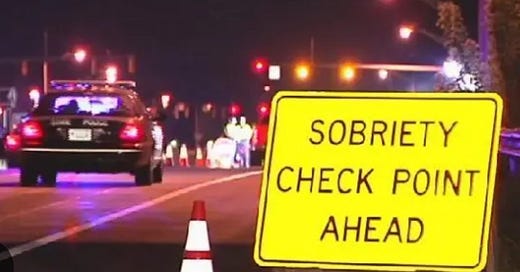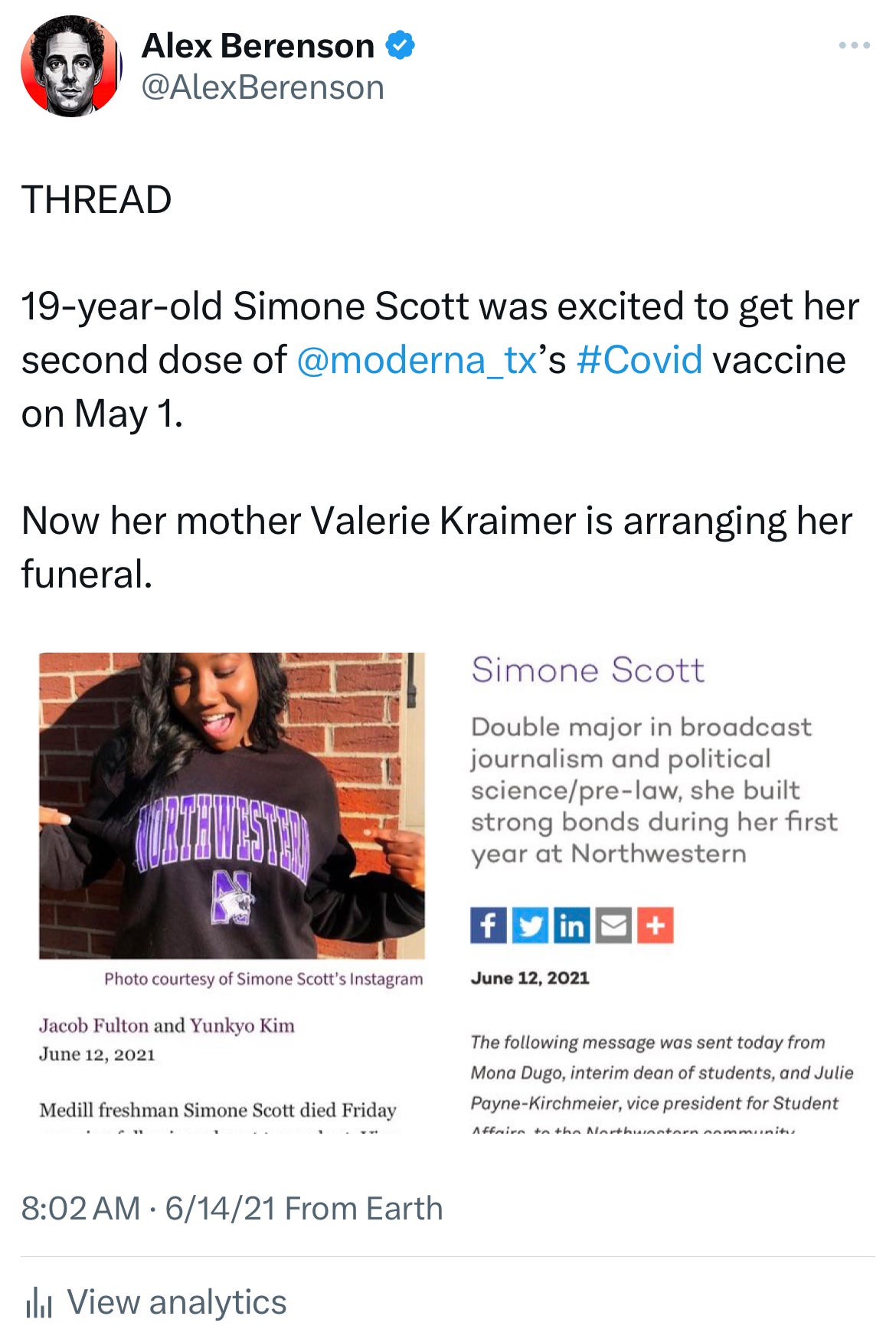On the coercive power of government
And why the fight to protect our Constitution and our rights will never end
Last month, my rights were violated up close and personal.
I was driving home from New York City. 2 a.m. Sunday morning. Four-lane divided highway. Empty. I was exhausted, alone, and sober.
Ahead I saw a police sedan’s flashing lights. A drunk driving checkpoint. State troopers, not local cops.
I slowed, pulled up, lowered my window. Can I see your license?
I know sobriety checkpoints have been found constitutionally okay. In my opinion - which predates this interaction - they aren’t. Want to pull me over because I’m speeding, or failing to signal, or weaving? Have at it. Sure, no one drives the limit at 2 a.m. (or ever) on Route 9, but at the least I have committed a legal infraction.
But stopping me when I have broken no law - not even, in the famous words of Jay-Z, doing fifty-five in a fifty-four — and demanding identification?
That game should not be allowed in the United States of America.
—
(Help me stand up for my rights. And yours. Help me fight.)
—
Nonetheless, I handed over my license.
Have you been drinking?
Well, I’d had a beer at around 11 p.m. Three hours before. One beer. I’d actually been at my mother’s place. Earlier, I’d driven her to New York from New Haven, where she had gone to my father’s 60th Yale University reunion (they invite widows, which is nice). I had briefly stopped by my 30th.
I wanted to get back to my kids during the night, when I knew the city traffic wouldn’t be bad. I knew this would be the last leg of a lot of driving, and alcohol doesn’t mix well with quiet highways at night. So just the one.
I had a beer, I said. Maybe three hours ago.
I expected to be waved on. I was alone, I was cooperative, I had no open containers or alcohol of any kind in the car. And I can guarantee you I did not smell of alcohol.
But I’d said the wrong thing, because the trooper got very interested.
Just one, he said? Are you lying?
Nope.
People lie. What were you doing in Manhattan?
I told him, or tried to. By now I was nervous and stammering. Though I had done nothing wrong.
He waved me over to the two troopers ahead. They asked me the same questions and shined a flashlight in my eyes and told me I needed to take a roadside sobriety test.
Now, what I should have said at this point is, what exactly is your probable cause? I told you I had one beer three hours ago, you have no evidence I’m lying, that’s the end of this.
But the words “probable cause” never left my lips. I was nervous and looking at guys with hats on their heads and pistols on their hips at 2 a.m.
I didn’t argue. I pulled over.
—
I parked badly, at an angle, because I was nervous. The trooper told me to get out and I got out. I was shivering, partly because it was cooler than I expected, mainly because I was nervous.
I told him I was going to have a problem standing on one foot because of my drop foot. This was true, but as I was saying it I realized I probably sounded guilty.
He shined a flashlight in my eyes and told me he was going to move a pen side-to-side and I should follow it. I learned afterward this is called an eye stuttering or “nystagmus” test. Supposedly, your eyes will not follow the pen smoothly if you have been drinking.
The problem with this test is obvious. The I’m-watching-your-eyes-while-you-follow-the-pen game is extremely user-dependent at best, voodoo at worst.
Either way, if a trooper wants to take the next step and breathalyze you, he is going to say you have failed. Who are you are to argue? It’s his test, he is judge and jury.
After a few seconds more, the trooper lowered the pen and pulled out a little straw. Blow on this, he said.
He didn’t explain what he was doing or give me the chance to decline — though declining comes with an trip to the clink, at least you are having a conversation about your options. He more or less stuck the straw in my mouth.
I blew.
—
(Non-scene of the non-crime.)
—
You blew zero-point-zero, the trooper said a few seconds later. (Told you I was sober. And that I could guarantee you I didn’t smell of alcohol.)
He sounded disappointed. (A cop would later tell me that he probably was, he’d been looking forward to getting me in the back of his cruiser.)
He gave me back my keys and I drove off.
—
I was furious when I got home. Furious when I woke up the next morning. My stomach is churning just writing this.
Furious at the cops for violating my Fourth Amendment rights against warrantless searches. And at myself for not standing up to them.
But the government’s coercive power is very, very real. And it metastasizes. It has to be checked constantly. Because the people in charge will always tell themselves they have good reasons to do what they’re doing. They all have good reasons your rights don’t matter.
You see where this is going.
I can’t do anything about that checkpoint. It’s over.
But I can do something about the fact that Andy Slavitt “asked” Twitter to ban me when he was a senior official at the White House in 2021 and kept “asking” until he and the Biden Administration and Pfizer’s board members got what they all wanted, my First Amendment rights be dammed.
—
(And I am doing something. With your help.)
—
The thing is, Berenson v Biden - my federal lawsuit over that 2021 conspiracy to silence me - isn’t just for me.
It’s for everyone who followed me on Twitter - and everyone I wrote about.
Including Simone Scott. A 19-year-old college student who died of myocarditis only weeks after receiving her second mRNA Covid shot.
That tweet was viewed two million times - far more than the average cable news show.
By July and August 2021 my tweets were being viewed close to 10 million times a day. And my reach was only growing.
Until Slavitt and the gang forced Twitter to censor me. I still had Substack, and Substack was nice, Substack was great, but nothing I’ve written on here has ever been viewed two million times. Twitter gave me a worldwide audience.
Which is why they had to take it from me.
Missouri v Biden is gone (basically). But I have the standing - the proof of particular injury caused by particular conduct - those plaintiffs lacked.
And, with your help, I intend to show the Biden Administration - and the world - that the First Amendment still matters.






Never. EVER. Admit to having had a drop of alcohol when pulled over. EVER. All you were doing is giving them probable cause to pull you out of your car and intimidate you and to try to find additional evidence to use against you. Don’t make their job easier. Make them prove the case against you without helping them.
Great posts. Absolutely it's unconstitutional.
I had a similar incident.
So I got pulled over one time with friends. I had a test the next morning, so I told my friends, I would drive them, but that I'd only have two beers. Which is exactly what I did over the course of 3.5 hrs.
I went through a DUI checkpoint. And of course, I had to get out of the car to go through a field sobriety test. I passed it...well because I wasn't drunk. I even asked two police officers if I passed. They said, yes, you're obviously not drunk, but we need you to blow into a breathalyzer. I refused.
This was in CA when their were no exceptions. You had to blow or they'd take your license and take you to jail. So I spent a night in jail and had to get a cash advance on my credit card to pay bail. I defended myself in court. I received an apology letter from the Dept. of Revenue and received my license back. True story.
That didn't keep me from driving around for 3 months during the time my license was suspended...